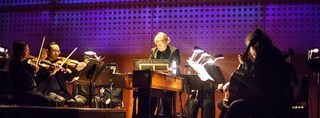|
Back
Introducing Mr. Potter New York
Alice Tully Hall, Lincoln Center
09/22/2016 -
Cipriani Potter: Symphony No. 10 in G minor
Felix Mendelssohn-Bartholdy: Symphony No. 3 “Scottish”, Opus 56
Hector Berlioz: Les Nuits d’été, Opus 7
Avery Amereau (Mezzo-soprano)
American Classical Orchestra, Thomas Crawford (Artistic Director, Founder, Conductor)

T. Crawford and ACO (© ACO)
One could imagine the name Cipriano Potter as Harry’s wicked Sicilian brother casting ancient spells in the apses of Palermo Cathedral. But as we learned from conductor Thomas Crawford and the American Classical Orchestra (ACO) last night, Cipriano Potter wasn’t that malicious. He simply wrote symphonies in early 19th Century England.
We also learned from the personable Mr. Crawford that Cipriano Potter was an esteemed conductor, a brilliant pianist, a prestigious esteemed educator and a highly educated linguist. Plus, he wrote ten or twelve symphonies. None of which are performed today, except by Mr. Crawford and his band of instrumentalists.
More power to the ACO, though not for unveiling Cipriano Potter. His G Minor Symphonylast night was, at most, a very prudent Sturm und Drang piece, partly like late Haydn written in Schubert’s era (1833), properly orchestrated, a bit long-winded (30 minutes) and not terribly impressive.
True, this 10th Symphony was, according to the program, “praised by Richard Wagner.” But that has as much veracity as a declaration by Mr. Trump.
The reality was that Wagner visited England for the sole purpose (as he never stopped telling everybody) of making money. He was blatantly nasty, despising (in no particular order), the people, the orchestras, the weather, and the fact that the English loved der jüdische Zwerg Felix Mendelssohn.
Cipriani Potter, though, put him in a good mood. Not only did he speak fluent German, but he had once met and impressed Ludwig van Beethoven. Most important, he bowed, scraped and paid endless compliments to Herr Wagner. Thus, when Wagner was asked about Potter’s symphony, he said, “A very amiable work, though old-fashioned.” And that is enough to rate as “praise” in most biographies.
This 10th Symphony is charming, constructed as well as a Haydn symphony, yet, from what we heard last night, shouldn’t have been on the same program Mendelssohn’s “Scottish” Symphony. Mr. Potter was in the forefront of the British musical scene, but this work simply lacked good tunes.
Mr. Crawford conducted with his usual crisp energy (and despite its rarity, without a score!), but it didn’t come across. Some obscure composers deserve to be resurrected, if not for inspiration as for eccentricity. Cipriani Potter was too proper, not quite inspired enough.

A. Amereau (© ACO)
Onto the most substantial work on the program, Berlioz’ ravishing Les Nuits d’été, sung by the ravishing young mezzo-soprano, Avery Amereau. Both her name and her enunciation would point to a French upbringing, though she is from Florida. Her work with the Metropolitan Opera and concert halls through Europe and America show that she is more than a “budding” star. While not a household name, she is a luminary in her own right.
The Berlioz was, in my opinion, weakened by the ACO strength. Mr. Crawford created this orchestra 32 years ago for playing “period” music of the 17th, 18th and 19th centuries. By the 19th Century, though, instruments which we call modern were all the rage, and players were held up only because of certain technical limitations.
We know that Berlioz, had he heard 20th Century orchestras, would have embraced the sounds with his usual Gallic enthusiasm. So by accompanying Ms. Amereau with 50 instruments which resembled our own except for being less colorful, did her a disservice. Alleviating that, though, the darkness of the colors added a melancholy, a background less of a French pastoral setting as of a mysterious forest.
Ms. Amereau surpassed the orchestra with her own contralto voice. As Mr. Crawford explained, this is a rarer quality, the lowest of the female voices. And one felt this, in the more tranquil songs, and almost breathless Villanelle.
Ms. Amereau has a richness in those lower registers, but she was not averse to giving a freshness and at time a cautious seductive joy. True, I missed some of the mystery of the poetry, some of the intimacy of the words. Yet this was not necessary. Ms. Amereau’s forte was of classical balance, an aplomb which was never accentuated, but which gave what is often missing in Berlioz.
Romantic as he was, Berlioz and his poet, Théophile Gautier, were not wild-eyed eccentrics. Their beauty came out of the underlying nuances. And in that, Ms. Amereau proved a sensitive artist.
The ACO had no problems with the final work, Mendelssohn’s “Scottish” Symphony. Mr. Crawford pulled out the introduction’s mystery from his 50-odd players, and gave an energy all the way to that glorious chorale. A shame that we had to waste 30 minutes with the mediocre Cipriani Potter. Yet these three works, all written within five years of each other, offered a good picture of serious Early Romantic music.
The American Classical Orchestra
Harry Rolnick
|